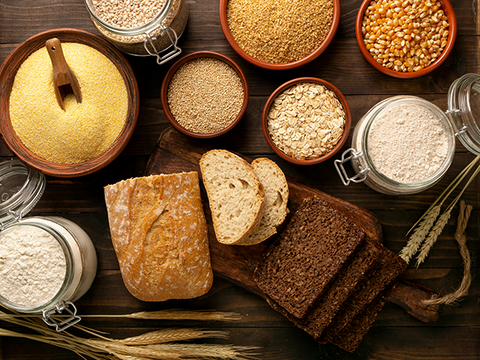Eat better Feel better
LowGlycemic Index (GI)
The Glycemic Index (GI) measures how quickly carbohydrates in food raise blood sugar levels. Foods with a low GI release glucose slowly into the bloodstream, providing a steady and sustained source of energy. Some of the key benefits of a low GI diet include:
- Better blood sugar control: Low GI foods can help stabilize blood sugar levels, which is particularly beneficial for individuals with diabetes or those at risk of developing it.
- Sustained energy levels: Low GI foods provide a gradual release of energy, helping to prevent spikes and crashes in energy levels throughout the day.
- Weight management: Low GI foods may aid in weight loss and weight maintenance by promoting satiety and reducing cravings for high-calorie snacks.
Gluten-Free
Gluten is a protein found in wheat, barley, and rye, and it
can trigger adverse reactions in individuals with gluten intolerance or celiac disease. Choosing gluten-free foods can offer several health advantages:
- Digestive health: For individuals with celiac disease or gluten sensitivity, avoiding
gluten-containing foods is essential for preventing gastrointestinal
discomfort, inflammation, and damage to the intestinal lining. - Improved nutrient absorption: Eliminating gluten from the diet can enhance nutrient absorption and alleviate symptoms such as bloating, diarrhea, and fatigue.
- Enhanced mental clarity: Some individuals report improved cognitive function and reduced brain fog after adopting a gluten-free diet, although more research is needed to fully understand this effect.
Diabetic-Friendly
A diabetic-friendly diet focuses on controlling blood sugar
levels and managing insulin resistance. This type of diet typically includes whole foods that are low in sugar and refined carbohydrates while emphasizing lean proteins, healthy fats, and high-fiber sources. The benefits of a diabetic-friendly diet include:
- Blood sugar management: By choosing foods that have a minimal impact on blood glucose levels, individuals with diabetes can better regulate their condition and reduce the risk of complications.
- Cardiovascular health: A diabetic-friendly diet that prioritizes heart-healthy fats and fiber-rich foods can help lower cholesterol levels,improve blood pressure, and reduce the risk of heart disease.
- Weight control: Managing portion sizes and selecting nutrient-dense foods can support weight loss or weight maintenance goals, which is crucial for diabetes management and overall health.
No Maida (Refined Flour)
Maida, or refined flour, is a highly processed ingredient that lacks essential nutrients and fiber. Consuming foods made with maida can contribute to various health issues, including weight gain, blood sugar spikes, and digestive problems. Opting for maida-free alternatives offers numerous health benefits:
- Nutrient density: Maida-free foods, such as those made with whole grains or alternative flours like almond or coconut flour, are richer in vitamins, minerals, and antioxidants, supporting overall health and well-being.
- Digestive health: Whole grains contain fiber, which promotes healthy digestion, prevents constipation, and supports a diverse gut microbiota.
- Long-term disease prevention: A diet low in refined carbohydrates, such as maida, is associated with a reduced risk of chronic diseases like type 2 diabetes, cardiovascular disease, and certain cancers.





